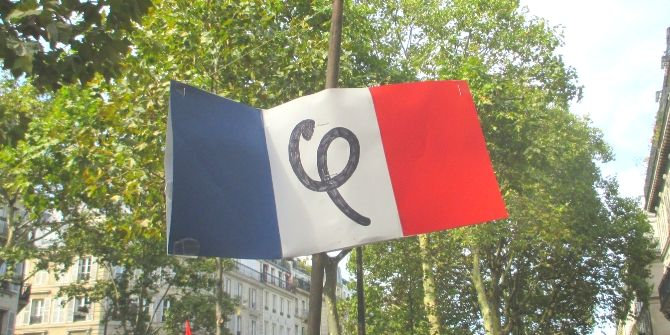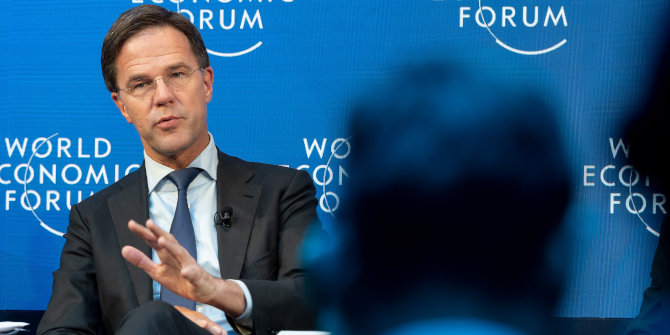The rise of online communication has led to a fundamental shift in the way democracy functions. Rudi Laermans and Anton Jäger argue that a central component of modern European democracy is the split between ‘people’s populism’ and ‘citizen populism’. Both variants of populism, though built on radically different philosophies, share a goal of fostering direct links between citizens and policymakers. Yet without effective intermediaries to help facilitate interest formation processes, it is questionable whether these approaches can meet the challenges of the contemporary world.
Are Europeans currently witnessing the death struggle of their party democracy? Judging from recent developments in Belgium, the struggle certainly feels real. Conner Rousseau, leader of the Flemish Socialist Party, announced a new name for his party at the start of September last year: the sloganesque ‘Vooruit’ (Forward), considered to have more appeal than a name referring to the party’s socialist roots.
A few days later, liberal politician Mathias De Clercq hinted at a transformation of his party into a ‘movement’. Christian-Democratic chairman Joachim Coens has expressed similar sentiments, stating that he would like his party to become a ‘network’ that also consults non-members, with a possible name change as a result. ‘Samen’ (Together) is one option that Coens mentioned in a conversation with the Flemish newspaper De Zondag – with ‘Together Forward’ now a coalition possibility.
Flanders’ party chairmen are merely following foreign examples. Italy possesses a digital network party in the shape of the Five Star Movement, while the Spanish Podemos has stylised itself into a ‘party movement’. In France, President Emmanuel Macron launched La République en Marche, catapulting an entire generation of political novices into the French parliament.
Movements and loose electoral vehicles of this kind are claimed to herald a new future within democracy. Direct lines of communication with citizens are intended to counter steadily decreasing party membership numbers and an increasingly volatile electorate. Yet while parties survive as policy suppliers, they are simultaneously experiencing an internal hollowing out.
Expertocracy
The rise of the neo-party follows a broader trend toward individualisation in European societies, which drives the popularity of these new forms of democracy. A notable example of this is the increasing prominence of ‘participatory democracy’. In its official version, participatory democracy envisages citizens and administrators co-creating policies. It assumes that citizens are eager to take on public services such as managing libraries, maintaining parks and, if necessary, performing policing duties. In the Netherlands, this discourse already inspires local policymaking, while Belgium is following closely behind.
In addition, there are non-partisan citizens’ movements, including local initiatives such as the Antwerp Straten-Generaal, and international networks such as Extinction Rebellion. But the cornerstone of the new citizen democracy is the practice of deliberative democracy: the choosing of citizens by lot to deliberate on policy measures to tackle, for instance, the climate crisis. These balloted citizens are then charged with discussing the topic at hand, but not in an epistemic void: first a variety of experts inform them on the subject, as in David Van Reybrouck’s G1000 experiment. In subsequent discussions, the best argument will prevail; or that much is supposed (in Habermasian fashion).
‘Technocracy’ and ‘citizen democracy’ thus seem to entertain a tense marriage. Today’s proponents of deliberative democracy sanctify the individual citizen’s capacity to make sound judgments. At the same time, they stipulate that citizens can only exercise this capacity for judgment effectively when provided with sufficient expert information. The relationship between citizens and democracy is thus filtered through a process of ‘expertocracy’.
Two types of populism
In principle, citizen democracy should complement representative democracy: the citizens advise, the representatives decide. The idea seems plausible since citizens and advisory experts do not have a mandate to make decisions. At the same time, the practice of deliberative democracy suggests that reasonableness is correlated with information: the best informed can make the best argument. There is more than a grain of truth in the idea that citizen democracy favours the higher educated, whose media literacy is significantly higher than the social average.

Credit: Shutterstock
The neo-party and citizen democracy both assume that a loose aggregation of citizens can express a general will through a poll or deliberation. This will is the sum of individual opinions – or their synthesis, filtered through expert advice – and not the emanation of the kind of fixed popular or national identity invoked by right-wing populist parties. Hence, we may distinguish between two types of populism: ‘people’s populism’ on one side, and ‘citizen populism’ on the other; here the nation-state, there the republic.
People’s populism and citizen populism both engage in identity politics. Citizen populists act in the name of either minority groups or the assumed individuality of an emancipated citizen. People’s populists, on the other hand, pursue a form of identity politics that defends the identity of a beleaguered majority. The French philosopher Pierre Rosanvallon recently summed this up elegantly: “In the midst of a general fragmentation of identities, populism tries to create a new unity based on its identity.” Populism equals universalist identity politics – in the name of ‘the people’ or ‘the citizen’.
Media mediation
Both variants of populism also want to undo the intermediary role of civil society. Belgium and Flanders are unique in Europe in the richness and breadth of their civil society (the unionisation rate was just over 50 percent in 2019). Nevertheless, Belgian parties are increasingly adopting a new stance towards their civil society subsidiaries. In the communications department of the Flemish nationalist party N-VA, for instance, no fewer than twenty people are employed to maintain something of a digital simulacrum of civil society. The idea is that while the party is ideologically tied to the ‘Flemish people’, its digital message is now addressed directly to individual citizens.
People’s populism and citizen populism share a common goal of establishing direct representation at the heart of government, independent of intermediary institutions. In the case of citizen populism, the ideal citizen is empowered and headstrong, with little tolerance for patronage and no trade union membership. The natural public habitat for this citizen is social media, which undoubtedly suits certain politicians very well.
Citizen populism also seeks to rewrite the social contract. In dynamic societies with fewer permanent jobs and higher ratios of self-employment, the corporatist welfare state built on trade unions and insurance funds is now said to be obsolete. Direct cash transfers, such as those envisioned under a basic income system, are viewed as the guarantor of security for the new ‘precariat’. A basic income system could be implemented without large institutions that stand between the government and the individual. It could also be introduced quickly and cheaply while respecting the new pluralism in society. In short, individuals know what is best and letting parties or trade unions determine our collective needs is viewed as ‘authoritarian’. That this would be paired with a tearing up of the patchwork of social rights is the price of progress: revolutions are always abrupt.
Citizen populists can draw on existing forms of crisis management for this new social contract. After all, central banks already manage our economy with techniques such as quantitative easing. Why should this technocratic treatment not be possible for the bottom end of society, with a basic income functioning as ‘QE for the people’? As such, the marriage of technocracy and populism – what Christopher Bickerton and Carlo Invernizzi term ‘technopopulism’ – is both political and social.
After interest mediation
The gap between these populist approaches and post-war party democracy is a profound one. In the post-war period, parties typically sought to defend interests via consultation with fraternal organisations. Parties and their allies often sat on one side of a deep political divide, given the sharp philosophical and ideological differences that were present within society at the time. Yet because there was a shared orientation on all sides toward the process of interest mediation, it was generally easier to negotiate compromises. The corporatist party democracy thus served to establish a degree of stability within the political system.
Today’s ‘movements’ offer a more flexible model of democracy. The benefit for citizens is they no longer have to engage in long-term associations with organisations to make their voices heard. Politicians, in turn, can be liberated from the recalcitrance that once characterised political congresses in the past. While participation between electoral referendums is possible, however, technocrats determine the contours of policy, with the occasional participatory nudge from below. Party spin doctors provide the necessary window dressing.
Whether people’s and citizen populism can meet the challenges of the twenty-first-century, from climate change to Covid-19, remains doubtful. Once divorced from interest formation processes, political engines generally begin to sputter. An illustrative example was given by the Flemish eco-party Groen. In 2019, the party announced plans to phase out the indirect subsidising of personal company cars – an almost inevitable step toward greater ecological sustainability within Belgium. A storm of protest followed. But rather than this precipitating a conflict between established interests, Groen simply withdrew the proposal. This pattern is a frequent occurrence when citizens informed by experts sit together.
While the digitally anchored ‘audience democracy’ of the twenty-first century may provide endless entertainment, there can be little doubt that Europe’s democracy currently finds itself in a state of deep and protracted crisis. The new citizen populism is not a viable answer to these challenges.
Note: This article gives the views of the authors, not the position of EUROPP – European Politics and Policy or the London School of Economics. Featured image credit: Shutterstock





